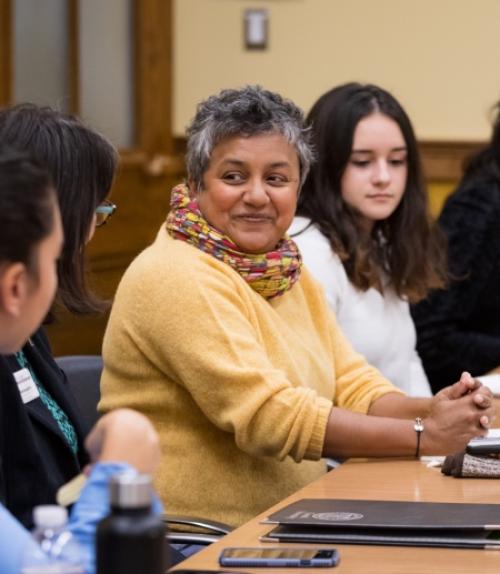Deblina Datta ‘90 visited campus Oct. 19 for a career conversation hosted by the Arts & Sciences Career Development Center. She spoke about her transformative experiences working with the Global Polio Eradication Initiative and many different opportunities in the public health world.
As a student, Datta was a biology major concentrating in genetics and development and pre-med. She was drawn to the sciences and medical profession from a young age, but it wasn’t until the end of her residency at Mount Sinai when she participated in the Center for Disease Control’s Epidemic Intelligence Service working for HIV prevention that she discovered her passion for public health.
“When I was here, I didn’t have a vision for doing something in public health. I knew I wanted to go to medical school, but I was more focused on becoming a traditional practitioner.”
Now a global health physician at the Centers for Disease Control in Atlanta, Ga., Datta works as a senior scientific expert with the Global Polio Eradication Initiative, a partnership begun in 1988 between WHO, UNICEF, Rotary International and the CDC.s. She is also course director of vaccinology at Emory University and held prior roles in HPV initiatives and CDC partnerships with Gavi, a global vaccination organization.
As an employee of the CDC, Datta functions as an extension of the executive branch of the government, which Datta says is “doing very important work, both locally and globally.”
“When people think of affecting change, people usually think of charitable, religious and service organizations, but the one that focuses on every one of us and is accountable to all of us is the government,” Datta said.
Datta’s role is very travel- and time-intensive. She has worked in almost 50 communities across 35 countries in the developing world. “These are not vacations spots; the conditions are very rough. Often there’s no electricity and sometimes there are security concerns as well,” Datta said. Nevertheless, she appreciates the cultural exposure that comes with her job. “The experiences are so meaningful. It’s very powerful to meet these people and have them welcome you into their community and homes.“
Aside from the travel requirements, Datta described other challenges and joys associated with the complex mission of eradication, which she describes as “a moon shot” with “many many steps.” Although political and cultural limitations have impeded the initiative’s progress, the CDC has succeeded in reducing the number of paralytic polio cases from over 350,000 in 120 countries in 1988 to 22 cases in two countries in 2017.
“Right now, there’s only polio in Afghanistan and Pakistan, which we can’t reach because of political strife and turmoil.” Datta said. But she said it’s necessary to continue these efforts until there are no cases left. “If we stop where we are right now, the transmission of polio will be back to 250,000 paralytic cases of polio every year in the next 10 years. It’s a full time job, but the partnership to eradicate polio is really powerful and up for the challenge.”
Cornell continues to be an important part of life for Datta, who is now a parent of a Cornell freshman.
“She is loving it, and I love watching how excited she is about the same place that I was so excited about," said Datta, adding that she maintains close friendships with many of her friends from the Indian Students Association. “I’ve actually just been texting them about being back on campus and doing this career conversation, so that was very formative for me when I was a student here.”
When asked about advice she would offer to college students, Datta emphasized non-academic opportunities that she regrets not exploring more. “Really take advantage of all Cornell has to offer, like study abroad and getting involved in clubs to meet lots of people.There is much more to school than just putting your head down and studying.




